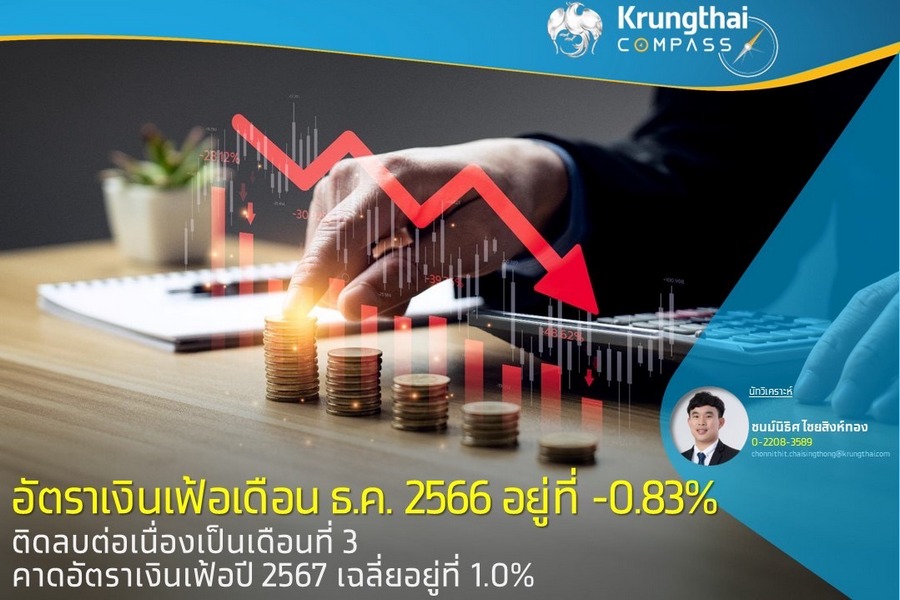

Although headline inflation will be negative for the third month in a row (October-December 2023), Krungthai COMPASS estimates that the Thai economy has not yet entered deflationary mode. Because of two reasons:
1. The government sector has measures to continuously reduce the costs of living in the energy sector. It is the main factor causing negative inflation, including the reduction in electricity prices since September, the reduction in diesel prices in October, and the reduction in gasoline prices in November. As a result, energy inflation in the fourth quarter of 2023 will contract -3.7% on an annual basis.
2. The price growth of some products slowed. This is because entrepreneurs are quick to release product inventory. and/or oversupply in the market This is consistent with information reported by the National Economic and Social Development Board Bureau (NESDB) that inventory has continued to decline in the past. Reflects the manufacturer offering products in stock for sale. He may lower prices to speed up sales of the product.
In addition, the supply of some products on the market has increased. Causing the price to fall, for example, the amount of pork in the system has increased in the past, causing the price of pork to continue to decline, but the prices of products in this group are expected to rise and are likely to rise after the supply gradually returns to normal.
Krungthai COMPASS estimates headline inflation in 2024 to average 1.0%, decelerating from 2023's 1.23% Energy category prices will likely be lower than in 2023, falling in line with retail oil prices. Both diesel and gasoline Under the assumption that the government will keep the price of diesel at no more than 30 baht per litre, which is down from its 2023 average price of 32.1 baht per litre, the price of gasoline is likely to fall. This is partly due to the tax cut that the government is expected to expand. (which will end on January 31, 2024) The average price of crude oil on the global market for the entire year is likely to be stable. Electricity prices tend to be slightly lower.
However, we must keep an eye on the risks of geopolitical conflicts. Especially in the Red Sea, this leads to increased shipping costs. Including pressure on crude oil prices to increase higher than expected.
The Commerce Department's latest revealed that headline inflation in December 2023 fell by -0.83% year-on-year, the third straight month of contraction and lower than analysts expected. As a result of the contraction of products in the energy category by -5.12% YoY, which is more negative compared to the previous month (November 2023) by -4.52% YoY in line with the government's policy to reduce the cost of living in energy. Both electricity and fuel prices In addition, the price of crude oil on the global market fell. Meanwhile, inflation in the fresh food category contracted for the fifth straight month at -2.3% y/y, compared to -0.76% y/y last month, after pork prices fell. This is because the amount of pork in the system has increased. Prices of fresh vegetables fell due to increased production.
As for core inflation, it reached 0.58% year-on-year, continuing to slow due to deflation of products, including cooking appliances. Meanwhile, product prices that expanded at a slower pace included non-alcoholic beverages. Food consumed in the home, blankets, soft shoes, etc.
As a result, the headline inflation rate in 2023 was 1.23%, while the core inflation rate was 1.27%.
By InfoQuest News Agency (08 January 2024)
Tags: KTB, Krung Thai Bank, deflation, inflation, Thai economy

“Reader. Infuriatingly humble coffee enthusiast. Future teen idol. Tv nerd. Explorer. Organizer. Twitter aficionado. Evil music fanatic.”
